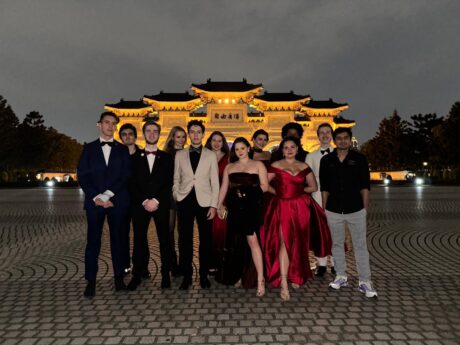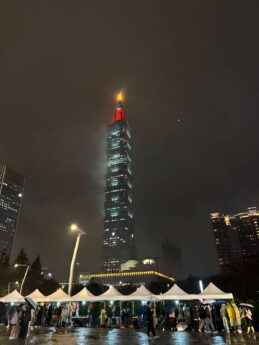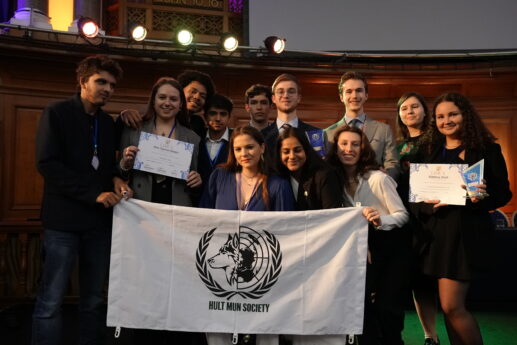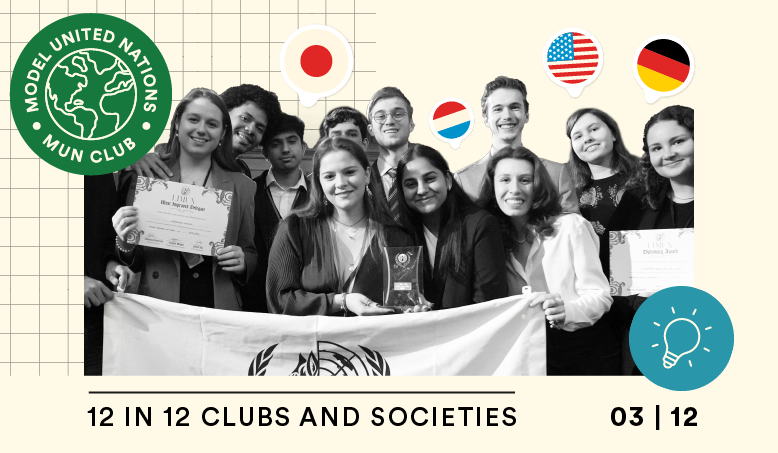Clubs & Societies 12/12 March: Model United Nations—Representing the World with Catalina Hepke
How many clubs can say they simulate real political crises and solve them during their meetings? Just one. This month in our 12 in 12 series where we spotlight a different Hult club each month, our attention turns to the Model United Nations. This fearless community from our London campus recently jetted to Taipei to meet with delegates from around the world. We chatted to Catalina Hepke, a Hult undergraduate, to get the lowdown on how the club debates high-stakes issues and remains friends afterward!
Here she is, in her own words:
A voyage into the past


The first thing you have to know about the Model United Nations (MUN) is that it’s like acting. You’re given a scenario and then you’ve got to respond to it as the actor state you’re assigned. That’s why, after arriving at the Harvard World MUN conference in Taipei, when I was given the role of the Soviet Union during the Chernobyl crisis of 1986—I wasn’t that stressed.
The real fun starts when you’ve got other delegates representing warring interests and you have to find a path through. Luckily. with these past recreations, you’ve got a wealth of knowledge to draw on. So, a lot of the debate happens after extensive research. I was evaluating the affected areas, handling rebellions, and navigating the desires of delegates representing other European states. All in a week’s work.
While I represented the Soviet Union during one breakout session, for much of the conference my team, Hult London’s MUN, was given the nation of India. That’s what was so great about the conference—there were moments to individually shine but also pull together and improve your diplomacy skills as a unit.


Taking on Taipei
Harvard World MUN is a huge conference, so the opportunity to network with people from all around the world was pretty exciting. You need time to relax and socialize after all the debates—and Taipei was an amazing city to do that in. You could be debating each other quite intensely during the conference and then out at a restaurant with the same people afterward!
Our meeting rooms were right next to Taipei 101, one of the tallest buildings in the world. So right away, we were in the middle of the action. We managed to find time to visit Taiwan’s famous night markets, eat delicious food, and party in the sky. I think our last party was on the 17th floor of Taipei 101. It’s a breathtaking city.
Home turf (LIMUN)
Taipei was crazy fun but only one in a long line of conferences. A few weeks ago, we were in London for the London Model United Nations (LIMUN) meeting. LIMUN is usually a bit tougher—it’s up a level in difficulty from the one in Taipei. You have 30 committees and 30 people in each one: normal committees, crisis committees, and humanitarian committees. This time it’s just delegations from Europe, and we tackle modern international crises.
I think another reason it’s more intense is that there are only three days, so there’s more to pack in. Our first committee meeting is immediately after the opening ceremony on Friday afternoon. In total, you are in your committee groups debating, researching, etc. for 16 hours. You form bonds and friendships really quickly.
Lessons from fiery debates


Straight away I was given the role of Iran in Yemen’s civil war. This humanitarian crisis is happening right now, but you can’t fear a subject with inflamed tensions. This is the nature of the MUN—you are a state and you must solve relevant issues. In this way, it’s important not to give away your personal stance, or any of your personality during debates. Again, it’s acting. I might completely disagree with my representative country’s actions, but in that room—I have to think as them.
To avoid altercations, we have a rule: no personal pronouns. So, instead of starting the statement with “I believe,” you are supposed to say: “the delegate from X country believes.” This way there can be no confusion and we can avoid any unpleasant situations.
The skills you learn through participating in MUN are too many to name. You learn to speak slowly and deliberately, wasting no words as well as actively listening to other delegates. Diplomacy isn’t a popular career among business graduates, but the skills can be applied to business too. I think I’m a much cooler person thanks to the MUN club (in both senses of the word). When I speak publicly, I have no fear.
What the future holds
Going forward as a club, the first thing we need is a break! More socials and more time to unwind and bond with each other. So many clubs are a chance to take up an extracurricular activity, but few are as intense as ours. That doesn’t mean I’m phasing the MUN out though. Quite the opposite—I want to get people involved in signing up. The benefits I’ve already mentioned are the main reason, but also, there are no requirements for entry. Just have a willingness to learn and a sense of curiosity about the world and you’ll be welcome.


